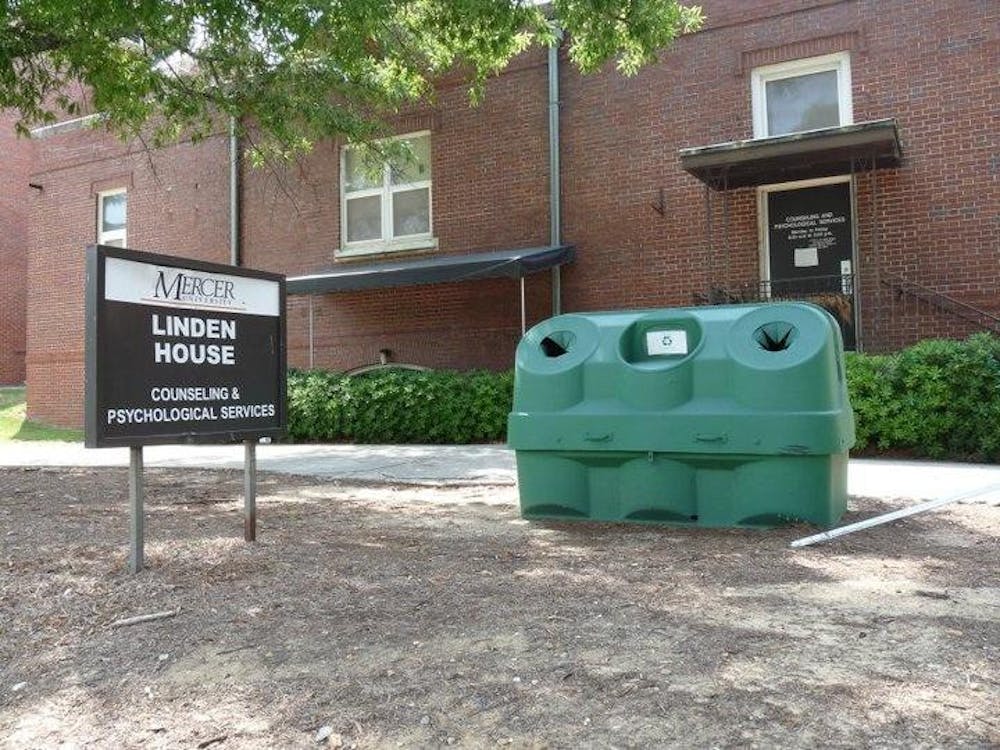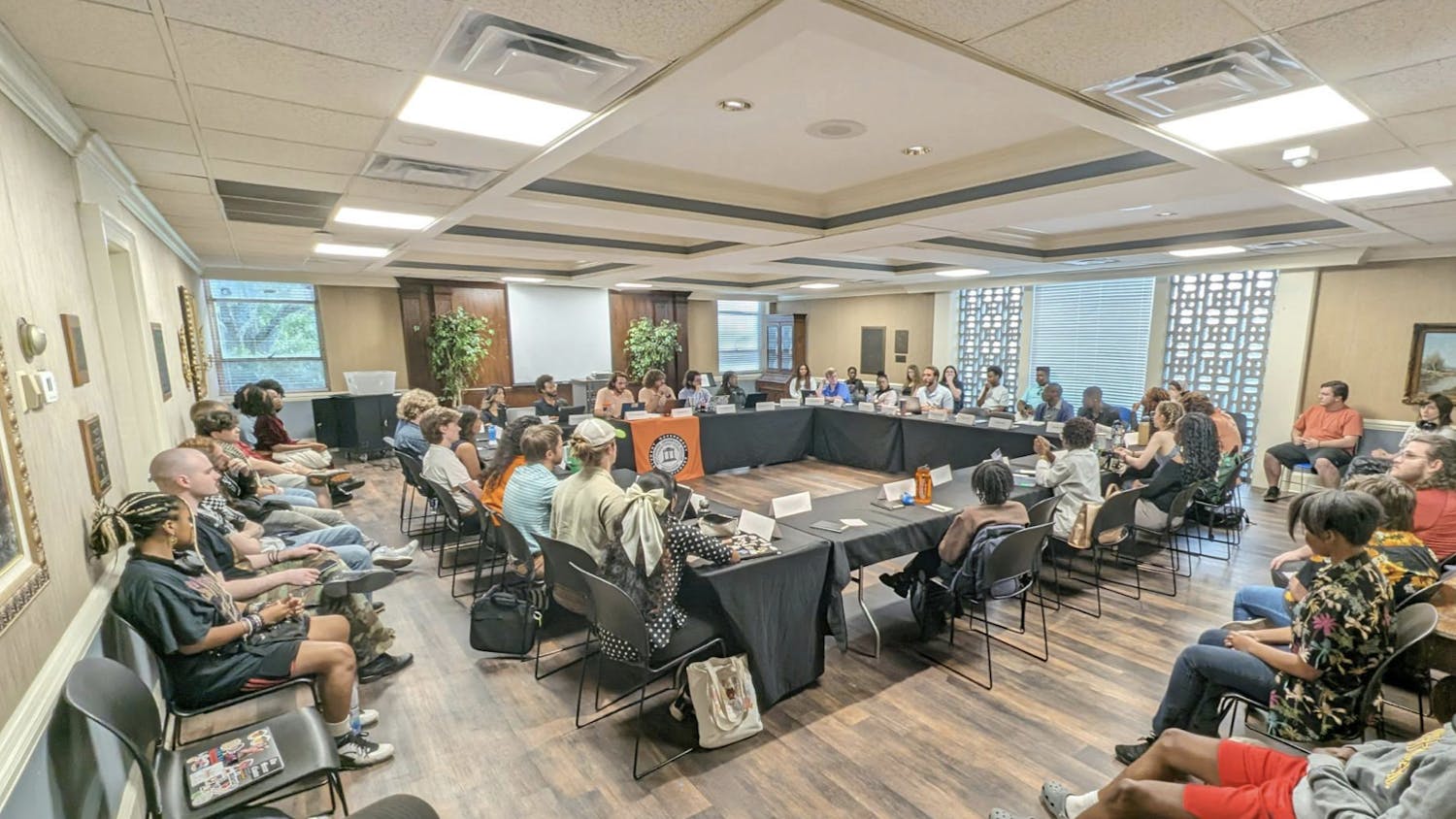Mercer’s Student Government Association unanimously approved legislation to contribute $2,500 to place new recycling bins on campus. Students for Environmental Action (SEA) requested the money from SGA’s special funding account.
SEA originally requested $7,875 from special funding, enough to purchase three new recycling bins, which amounts to nearly 50% of the remaining money in special funding.
After two weeks of deliberation, SGA approved the legislation to fund $2,500. A request has been made to the Board of Appropriations to match the $2,500, and President Underwood has committed to funding the rest.
Monday night’s vote came after the legislation had been tabled two weeks previously due to concerns over the amount of funding requested.
Parliamentarian Gene Mitchell had moved to table the legislation because the request came before a turnover in the voting body due to elections and in order to give President Jordan Locke and Vice President Ike Ekeke time to speak with the administration about the issue.
“The first time [the legislation] went through, I could tell that there was no one who was anti-recycling, but I could tell there were some senators who were a little leery about giving so much of our special funding budget to the recycling program,” said Jordan Locke, SGA president.
Over the past two weeks, SEA president Katie Martin organized a movement to gain student support for the recycling initiative.
SEA members and SGA members wrote a letter template to senators asking them to vote in support of the legislation and took copies to classrooms and dorms asking students to address them to their senators. Senators received more than 200 letters.
“It was really grassroots organizing at its finest on Mercer’s campus,” Martin said.
Martin explained that the new bins are needed because the existing program has been so successful since its inception last fall.
SEA has met with Physical Plant to determine the best locations for new bins. Currently, the plan is to put two bins near Winship-Adams and Garden apartments and one near Connell Student Center.
Mercer also stands to make money off expanding the recycling program, Martin said. Currently, the cost of managing the recycling is higher than any profit made from materials like cardboard, paper and aluminum cans.
“By having more bins, you have more recycling, and you can cover the cost,” Martin said. She believes this is an important step towards sustainability for the program.
Senator Mollie Davis expressed reservations Monday night for senators doing legwork for constituents.
“I applaud senators for working for causes like this, but I feel like in the past when organizations have come up and not done background work or not been fiscally conservative like we’d like them to, we’ve turned them down,” she said.
Senator Trent White, who helped Martin pass out letters, said he felt compelled to help with the initiative because it’s an issue that’s been very important to him. The move to bring recycling to Mercer was started during White’s presidency.
White said that, in the past, it has been part of SGA culture that senators do not do constituent services, but he disagrees with this mindset.
“I think since senators represent students, it’s important for them to take up causes the students want to be enacted,” he said.
Senator Bentley Hudgins said Monday night that some of the students who addressed letters to him had approached him with concerns that they had not been adequately informed of the cost of the program and may not have supported it had they known.
“I talked to them and I said ‘well I also wanted to ask you did you know that they’re asking for almost $8,000?’ and they said ‘no I didn’t know that,’ and I said ‘did you know they were asking for only three recycling bins?’, and they said ‘no I didn’t know that, and then I said, did you know this is almost 50% of our budget and we can’t afford to do that?’ and they said, ‘no but I wish you would have told me,’” he said.
While Hudgins said he is pro-recycling, he also said he has a problem rewarding actions that mislead students.
“It’s not an attack on SEA, I just don’t know if they realize what they did,” he said.
Parliamentarian Mitchell, who helped recruit students to sign letters, adamantly disagreed with Hudgins.
“When 36 people send you letters and your response to that is to question whether these people understand what they’re signing and then to accuse a student organization and members of senate of concocting some elaborate scheme to manipulate senators is utterly irresponsible, and I would hope that students would pay better attention to who they vote for. When people don’t understand what their constituents are conveying, you get answers and responses like that of Senator Hudgins,” he said.
Mitchell also stated Monday night that those handing out the letters asked each person if they were in favor of increasing the recycling infrastructure. If students had any questions about fiscal responsibility, they were answered, and every single person who signed was encouraged and waited upon to read the letter they signed, he said.
“It is very apparent that Senator Hudgins was blatantly and obviously trying to mislead his constituents by saying ‘only three bins’ because three bins almost doubles the availability of recycling on campus, which Mercer students have demonstrated that they want. For him to suggest to students that we can’t afford these bins is misleading,” Mitchell said.
White, after voting an “emphatic yes” to the motion on Monday, said he feels this is an excellent use of special funding, because it is a long term policy. “I think that SGA should be putting its funds towards public services and public goods that benefit the students,” he said.
Locke said he is glad the motion passed, but he is ultimately glad the motion was tabled so he could work out a solution that made it easier for the senate body to accept the motion and approve it.
He also said he was glad to do the extra work for the initiative. “If students are really passionate about wanting something like this, it is our job to help facilitate that,” he said.
According to Locke, the administration was incredibly receptive of the idea.
“The administration is pretty good with recognizing when students really want to get something done on campus,” he said.
He also believes the amount of support received made it easier for the president to support the initiative, since he feels Underwood is a president who respects students.
The Board of Appropriations has not issued a decision on whether it will match SGA’s funding, but Locke said he is optimistic.
“I think it would be a travesty if they decided not to use the remaining funds on the project,” he said.






